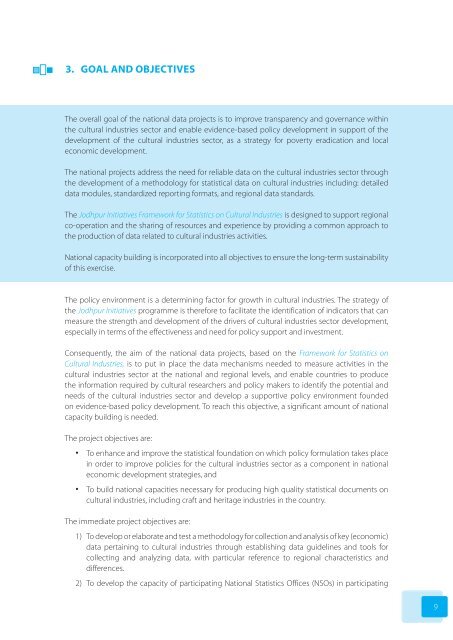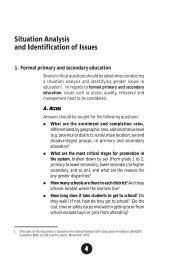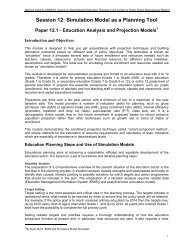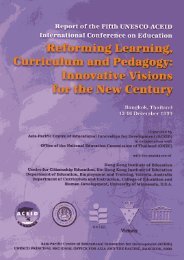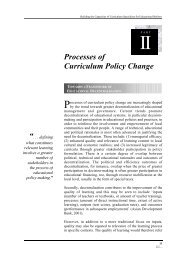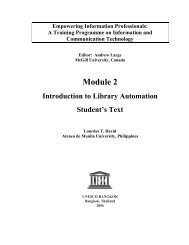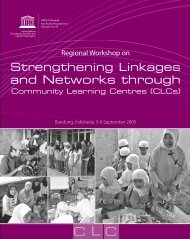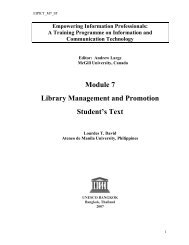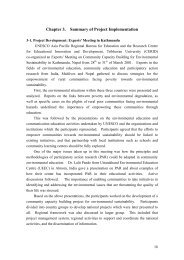Statistics on Cultural Industries - International Trade Centre
Statistics on Cultural Industries - International Trade Centre
Statistics on Cultural Industries - International Trade Centre
- No tags were found...
You also want an ePaper? Increase the reach of your titles
YUMPU automatically turns print PDFs into web optimized ePapers that Google loves.
3. Goal and ObjectivesThe overall goal of the nati<strong>on</strong>al data projects is to improve transparency and governance withinthe cultural industries sector and enable evidence-based policy development in support of thedevelopment of the cultural industries sector, as a strategy for poverty eradicati<strong>on</strong> and localec<strong>on</strong>omic development.The nati<strong>on</strong>al projects address the need for reliable data <strong>on</strong> the cultural industries sector throughthe development of a methodology for statistical data <strong>on</strong> cultural industries including: detaileddata modules, standardized reporting formats, and regi<strong>on</strong>al data standards.The Jodhpur Initiatives Framework for <str<strong>on</strong>g>Statistics</str<strong>on</strong>g> <strong>on</strong> <strong>Cultural</strong> <strong>Industries</strong> is designed to support regi<strong>on</strong>alco-operati<strong>on</strong> and the sharing of resources and experience by providing a comm<strong>on</strong> approach tothe producti<strong>on</strong> of data related to cultural industries activities.Nati<strong>on</strong>al capacity building is incorporated into all objectives to ensure the l<strong>on</strong>g-term sustainabilityof this exercise.The policy envir<strong>on</strong>ment is a determining factor for growth in cultural industries. The strategy ofthe Jodhpur Initiatives programme is therefore to facilitate the identificati<strong>on</strong> of indicators that canmeasure the strength and development of the drivers of cultural industries sector development,especially in terms of the effectiveness and need for policy support and investment.C<strong>on</strong>sequently, the aim of the nati<strong>on</strong>al data projects, based <strong>on</strong> the Framework for <str<strong>on</strong>g>Statistics</str<strong>on</strong>g> <strong>on</strong><strong>Cultural</strong> <strong>Industries</strong>, is to put in place the data mechanisms needed to measure activities in thecultural industries sector at the nati<strong>on</strong>al and regi<strong>on</strong>al levels, and enable countries to producethe informati<strong>on</strong> required by cultural researchers and policy makers to identify the potential andneeds of the cultural industries sector and develop a supportive policy envir<strong>on</strong>ment founded<strong>on</strong> evidence-based policy development. To reach this objective, a significant amount of nati<strong>on</strong>alcapacity building is needed.The project objectives are:••To enhance and improve the statistical foundati<strong>on</strong> <strong>on</strong> which policy formulati<strong>on</strong> takes placein order to improve policies for the cultural industries sector as a comp<strong>on</strong>ent in nati<strong>on</strong>alec<strong>on</strong>omic development strategies, andTo build nati<strong>on</strong>al capacities necessary for producing high quality statistical documents <strong>on</strong>cultural industries, including craft and heritage industries in the country.The immediate project objectives are:1)To develop or elaborate and test a methodology for collecti<strong>on</strong> and analysis of key (ec<strong>on</strong>omic)data pertaining to cultural industries through establishing data guidelines and tools forcollecting and analyzing data, with particular reference to regi<strong>on</strong>al characteristics anddifferences.2) To develop the capacity of participating Nati<strong>on</strong>al <str<strong>on</strong>g>Statistics</str<strong>on</strong>g> Offices (NSOs) in participating


